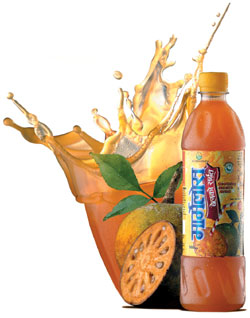It is said that whatever is good for you doesn't taste good and whatever is tasty is bad for health. Not so with bel juice.
The bel fruit grows wild in Nepal's tarai forests and has been used in traditional ayruvedic medicine. Now, community forestry groups are collecting the fruit and turning it into a tasty health drink.
Unlike most non-government development initiatives however, the bel juice industry is run and marketed like a multinational cola with flashy posters, a retail network throughout Nepal and also an export initiative. The product is marketed as Marmelous and the name is derived from bel's Latin name: Aegele marmelos.
 "We used to see the forest littered with rotting bel and decided to turn it into an income-generating activity for the villagers," says Gobinda Ghimire of Alternative Herbal Products, a private company that markets Marmelous and herbal teas in Nepal and abroad.
"We used to see the forest littered with rotting bel and decided to turn it into an income-generating activity for the villagers," says Gobinda Ghimire of Alternative Herbal Products, a private company that markets Marmelous and herbal teas in Nepal and abroad.
The company uses fair trade mechanisms to cut middlemen and ensure a commercially viable business selling forest products so benefits go directly to community forest user groups and farmers in Siraha, Saptari and Udayapur.
Says Ghimire, "The beauty of it is that everyone benefits. The farmer is paid Rs 6 for every kilo, the community forest user group get Rs 2 for every kilo and consumers benefit because they become healthier."
Indeed, an average farmer in Saptari can now make up to Rs 600 a day in the bel fruit season and the local forest user group earns Rs 300,000 a year just in royalties from bel harvests which it uses for community development.
The initiative started with seed money from German aid group GTZ and has transformed livelihoods wherever it has spread. Besides bel, communities also sell forest products like butter tree, millet and grass for broom-making. Alternative Herbal Products has increased capacity to produce 70,000 bottles of bel concentrate a year and soon wants to expand that to 500,000 bottles.
Says Prem Bohara, 52, in Saptari: "The bel in the forest used to just rot and turn into compost, now we all go into the forest collecting the fruit and selling it. Bel has given us a new future."
Ghimire says there are large parts of the tarai forests where bel is still not collected and the project could easily be scaled up nationwide. The fruit has traditionally been used as an offering to Shiva and is believed to be good for the digestive system, the heart and memory.
Restaurants in Kathmandu offer bel juice and at Dhokaima Caf? in Patan you can even order a bel juice cocktail: Nepal Libre.
[email protected] 01-6632942


